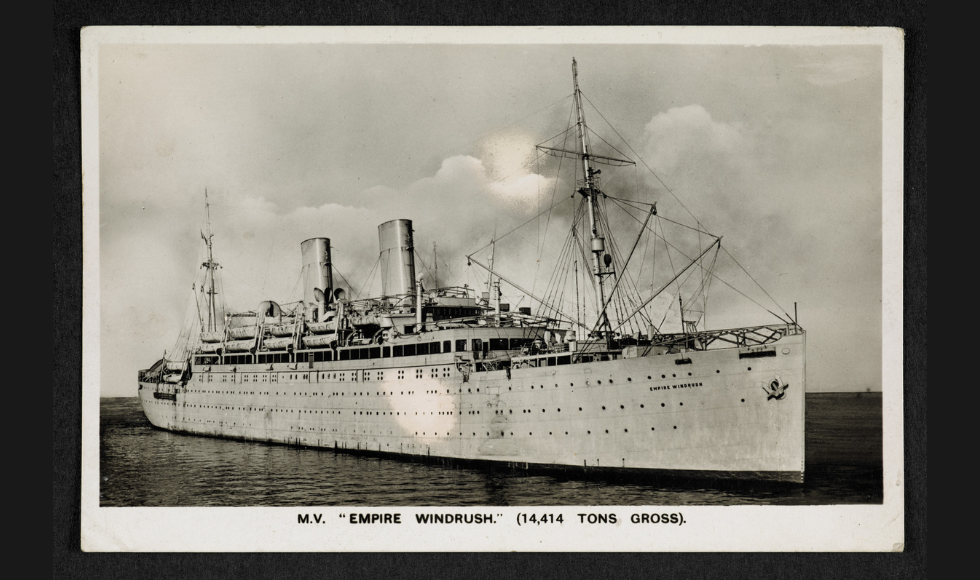Curious about the Windrush generation? Check out these books

June 23, 2023
This week, the United Kingdom marked Windrush Day, which remembers the 1948 docking of the SS Empire Windrush at Tilbury Docks in Essex. The ship carried 1,027 passengers, more than 800 of which had left countries in the Caribbean for new opportunities in the UK in the aftermath of World War II.
Facing a labour shortage, the British government had instituted the British Nationality Act in 1948, granting citizenship and right of abode to all people within the British Empire, which sparked a wave of immigration from across the world, including Caribbean countries like Jamaica, Trinidad and Barbados.
The Windrush has become a defining symbol of a generation of Caribbean immigrants who faced racism and discrimination, and, much later, threats of deportation, but who also made an indelible impact on English and Caribbean history, economics, art and culture.

English and Cultural Studies professor Ronald Cummings teaches a class called “Windrush Writing/ Writing Windrush: Empire, Race and Decolonization” which explores the literary work and historical context of writers of the Windrush generation and beyond.
Here, he recommends a list of 10 essential works that provide a glimpse into that unique body of work, as well as the authors’ literary legacies among more contemporary Caribbean and British writers.
Click here to learn more about Cummings’ class and his work with archival librarian Myron Groover.
Samuel Selvon, The Lonely Londoners (1956)
RC: This year has been marks 100 years since Selvon’s birth in Trinidad in 1923. His novel The Lonely Londoners has become almost the quintessential text of migration to Britain. It has a stunning opening that narrates the experience of arrival into London as almost an alien encounter marked by reflections on the weather and climate. It is rendered grey and “grim” and foreign.
“One grim winter evening, when it had a kind of unrealness about London, with a fog sleeping restlessly over the city and the lights showing in the blur as if it is not London at all but some strange place on another planet…”
Andrew Salkey, Escape to an Autumn Pavement (1960)
RC: Folks, including myself, have been going back to this work and thinking about its complex representation, not only of the experience of migration to Britain but for its nuanced representation of queer desire. It’s one of the early texts in the Caribbean literary tradition exploring those questions.
George Lamming, The Pleasures of Exile (1960)
RC: George Lamming, who died last year, is best known for his novel In the Castle of My Skin, but his book The Pleasures of Exile is a collection of essays reflecting on a number of important questions, especially that experience of exile and what it meant for that generation. It’s such an important text, and one that yields really productive re-readings – in particular for the kinds of reflections that he offers on the politics of literature, reading and representation.
Beryl Gilroy, Black Teacher (1976, republished in 2021)
RC: Gilroy was one of the few women writing in the Windrush period. What’s interesting about this book is that it’s been out of print, but it’s been recovered and republished with a new introduction by Bernardine Evaristo, the Booker Prize-winning novelist. It’s a book with a rich narrative that keenly explores questions of gender and class that we’re lucky to have again in circulation.
Samuel Selvon, Eldorado West One (published as a collection in 1988)
RC: This is another Selvon text that I thought was important to include because it’s a collection of radio plays – the radio itself, as a mode of technology, would have been so much part of the period. I think this is an important text from and of that time.
Andrea Levy, Small Island (2004)
One of the books that’s best known for reflecting on and re-narrating the Windrush period is Andrea Levy’s Small Island, which frames the narrative as a movement from one island to another. Of course, we tend to forget that England is an island as well. Small Island foregrounds the question of gender – women are at the centre of the text. It’s a beautifully written book, which was very well received when it came out.
James Berry, Windrush Songs (2007)
RC: James Berry is a Jamaican poet. He actually travelled to England not on the SS Empire Windrush but on the later journey of the SS Orbita. However, for people who study Windrush migration, this is one of the texts that they’ve gone back to because of its thoughtful exploration of the experience of migration to the UK (particularly through his use of voice) and the depth of feeling that Berry is able to convey in these poems.
Paul Mendez, Rainbow Milk (2020)
RC: This book takes up the intergenerational experience. Moving across 50 years in its narrative, it begins in the 1950s and closes in the 2000s. We get the experience of three generations of folks, connected by family but also connected by that experience of the encounter with England. Stories about migrant bodies are often narrated as labouring bodies, and what I think this book does brilliantly is it allows us to think about sex work as a particular form of labour in really challenging and insightful ways. It also foregrounds the queer experience. It’s a really complex and important addition to that whole body of writing.
Maria del Pilar Kaladeen and David Dabydeen, editors, The Other Windrush: Legacies of Indenture in Britain’s Caribbean Empire (2021)
RC: This is a critical volume that is interesting because it inhabits and uses a variety of narrative modes, including interviews, first person memoir, essays, critical reflections, and work that looks at archives, to remind us that the movement between the Caribbean and Britain wasn’t just an encounter between Blacks and whites. The story of indenture and the migration of Indian and Chinese labourers were also part of that history, and this book asks us to think much more broadly about that history of the Windrush migration.
Steve McQueen, director, Small Axe (2020)
RC: Small Axe, by British director Steve McQueen, is an anthology of five films, each of which narrates a part of the experience of West Indian migrants in Britain. McQueen finds filmic vernacular to capture the shifts across the decades and generations of diaspora making. Of keen interest to me is McQueen’s handling of questions of tempo and temporality as seen in his use of pacing in these films. It’s just a beautiful work.
For more on works about Windrush and influenced by that generation, check out these essays and publications:

